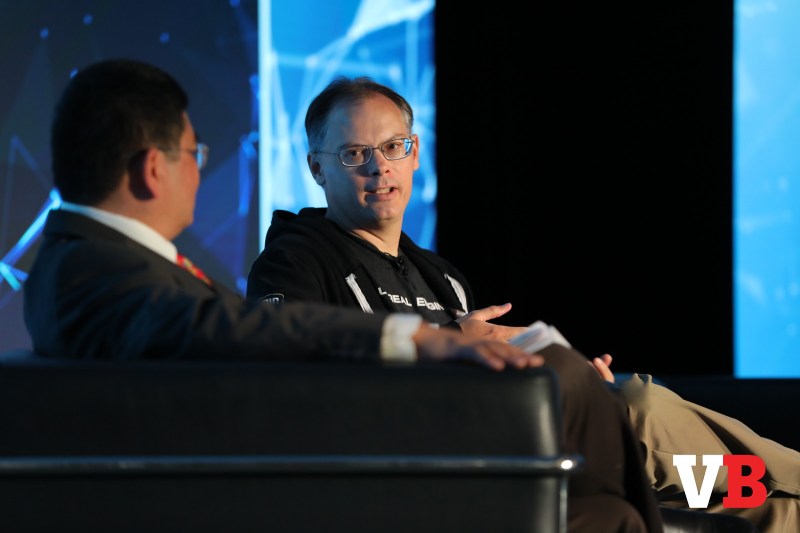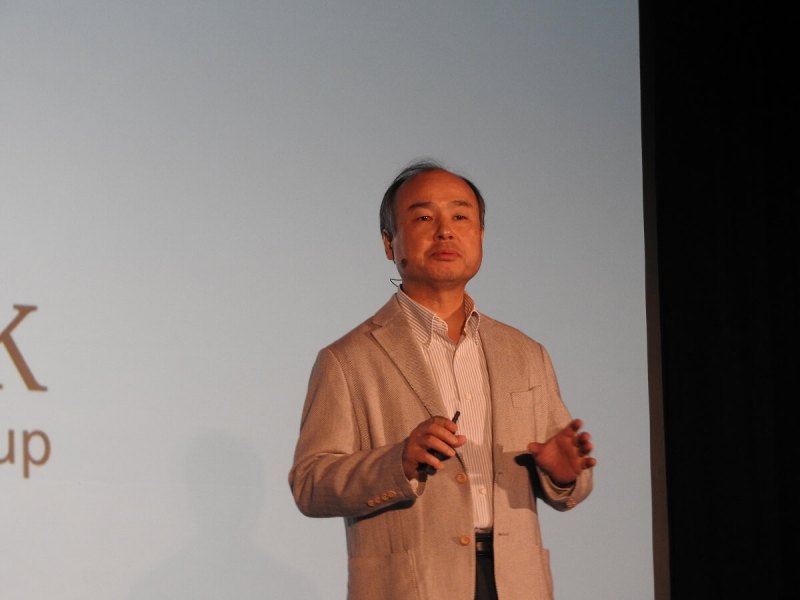
Above: A monster from Turtle Rock’s Evolve.
GamesBeat: It’s interesting how these cycles happen in the game industry. You think it’s going all in one direction. Disney, for example, invested heavily in games and then decided to blow it all up. They let go of Avalanche Studios in Utah, the maker of Disney Infinity, and shut the game down. That was a huge investment. But then, Warner Bros. picked up about half of that developer. Yesterday, NBC Universal announced that they hired Chris Heatherly, who had been doing mobile games for Disney. He’s going to create a 50-person game publishing operation focused on mobile and VR.
There’s a cycle here that happens. While Disney lost its religion as far as internally produced games, now Universal is picking that up. There are still opportunities. It’s a $110 billion business. Parts of it are growing — like mobile games. While in many ways it’s a bloodbath right now, it’s currently $38 billion, and it’s projected to go to $65 billion by 2020. There’s continuous renewal in the game industry. It does grow bigger over time. But there’s a lot of risk.
Goldstein: It depends on where the renewal is coming from. You’re talking about multinational conglomerates expanding their presence in the games business. That’s great for those companies, but then, the question becomes, what happens to independent developers in that ecosystem while this is going on? It feels like Amazon is almost taking over the industry with the amount of hiring they’re doing, but that’s all being built internally. You have a lot of people, a lot of more senior people getting pulled into these larger organizations and, I think, leaving this chasm where there used to be a lot of independent developers. Those are all going away.
The reason we still have a lot of independent developers in the business is largely because of VR. I’m sure that anyone representing developer clients, you’ve probably done at least 10 or 15 VR deals in the past year. For us, working with Oculus was pivotal. We weren’t seeing that ability to take on a larger project, and yet, here come these guys, and they need a ton of content quickly. Google is like this as well. They’re offering the best deals in the industry. They’re incredibly developer friendly.
Going back to the panel yesterday, when they were talking about all the various contract points that publishers will focus on — these guys are great because they understand that they need an independent development community to exist. In order to make sure that community exists, they’re incentivizing developers to make cool stuff. Under those deal terms, you’re making royalties right off the bat. One of the coolest things that’s happened to us in the past couple of years is we actually had a profit distribution to our employees because of what we were able to achieve on Oculus. That’s never happened with large-scale development.
I’m hoping that, as other companies start entering the VR space and also see a need to populate their hardware with a bunch of content, that they follow suit. Maybe we can dial back terms that have become very difficult for developers now in games and adopt those friendlier terms from VR. Those are the things that are going to sustain this business.

Above: Dean Takahashi (left) of GamesBeat with Steve Goldstein of Turtle Rock.
GamesBeat: I get a drift from you that the life of an independent game developer is hard and getting harder. But collectively, if you see the opportunities for independent developers, that’s encouraging. There’s always some other source of wherewithal to get your games done, whether it’s money or new platforms. And there are cycles to this.
I remember when Microsoft entered the console business. They were seen as the great hope for a revival of the American game development industry. It had weakened a great deal. Everyone felt like they were dependent on the Japanese platforms. Microsoft funded a lot of ideas out there, and some of them were very bad, but one of them was Halo, which made the Xbox take off. Eventually, Microsoft figured out where their hits were coming from and reinvested a lot of money there.
They went through a cycle during that console generation, and you can see Oculus doing the same thing now. Facebook put $250 million into VR startups. They pledged to put in another $250 million. But they’re starting to cull things now. They just decided to cut Oculus Story Studio. You can expect that these patterns happen, and it’s good for developers who — they might view VR as the part-time job they take while they figure out what to do in the future.
Goldstein: I’d disagree with that. I think a lot of developers are looking at VR and — we’re certainly looking at it as a requirement, a skill set that we’re building now because it’ll be an expectation in five years. Story Studio is a unique situation. Yes, Oculus is, I perceive, culling on the basis of some things are working and others aren’t. But Story Studio was a weird situation for them because that was an internal content team for Oculus. Facebook has never really been about building its own content, rather having others build it for them. They may have decided to go back to that old way of thinking, the more institutionalized way of thinking.
Question: Isn’t part of that just, it’s early in the cycle as far as hardware, and you need hardware installation to be able to sell your software? You’re spending X to make a story-driven experience, and it’s not appealing to the early adopter of your platform. So you close this down, and then, when there are 6 million headsets in circulation, you come back to it.
Goldstein: That’s a fair point, too. They were Rift only. That’s a rough installed base right now. Whereas Gear has 7 million units out there and probably much more than that as the [Galaxy S8 smartphone] takes off this holiday. VR is going to happen. It’s just that the way it’s going to happen will surprise people. I don’t think anyone expected mobile to be the thing that most people experience VR as. Everyone pictured the big-budget crazy experience. But in reality, when you show up at the AT&T store and they hand you this thing, and your kid grabs it and puts it on and has a great time, that’s how VR is going to become mainstream.
GamesBeat: [Unity Technologies CEO] John Riccitiello has a nice comment about how everybody thought VR would be like this (straight-line growth) and reach $100 billion at some point in the near future, when in fact it was going to be more like this (a curved growth path that starts out slow). You still get to $100 billion, but it’s a much slower takeoff than everybody was originally forecasting. You adjust your business to deal with this kind of curve as opposed to a straight line.
Jason Rubin, the head of internal games at Oculus, was saying that VR is the hardest medium, or the hardest kind of product, to develop these days. There are no rules. You have no idea if you’ll get it right. You’ll fail a few times before you get to the right product. You have to do a lot of prototyping. And you can’t shortcut that process. You can’t just say, “I’ll make the successful one now.” You have to continuously experiment and deal with the fact that a few early efforts are going to fail. That’s a hard bet for any kind of business person or investor to make. It has to be fueled by the Facebooks of the world.
Goldstein: The weird thing about VR, one of the things I think about — when you think about the very early days of the games business, or the home entertainment business, where you had … even before the Atari 2600, you had Pong. Pong was this giant console you’d attach to the antenna inputs and that whole deal. That had a pretty rapid adoption rate. It was a mass market thing. People could grab it, take it home, and have a good time. That led to further advances and development of technology that resulted in the 2600 and so on.
With VR, it’s almost the opposite. VR is giant corporations determining that they are going to set their stake in what the future of computing is going to be in 10 or 15 years and then trying to force that on the mass market. It’s fascinating to watch. I don’t know how long it’s going to take for them to get there. Facebook is going to do it. Microsoft is going to do it. Google is going to do it. But it’s a long-term vision that’s not going to be adopted by consumers in the same way that other electronic entertainment devices were many years ago.

Above: Tim Sweeney at GamesBeat Summit.
GamesBeat: I don’t necessarily believe that VR is the high school project sort of thing. I do think it’ll be transformative. It’s going to go by different names. Augmented reality is part of it as well in some ways. More recently, Tim Sweeney of Epic Games was talking about the metaverse. Ever since Snow Crash came out in 1992, everyone wants to build the metaverse. Second Life was a first attempt at that. Sweeney now thinks that within three years, somebody can do it. Somebody can go back to that original vision and build this virtual world that we can live in. You have things like Ready Player One, with the movie version coming out next year. It’ll be interesting to see what other things are timed to come out with Ready Player One.
Tim is very concerned about whether this metaverse is going to be open or not. He sees the platform companies making their plays to be the owner of the metaverse, to own it in every way — from payment platforms to content to data access — data that you may think is private but that’s really owned by them. You can see different companies jockeying for this position. We were talking about the cycle among the platform companies. It seems clear that to the platform companies, games are a means to an end. They want to control the platform and set it in the direction they want. Games are always great boosters for platforms, so they’ll support games.
If you look at SoftBank as an example, what the heck is SoftBank doing? They own Sprint. They want to merge it with T-Mobile. They bought ARM for $32 billion. At the time, Masayoshi Son, the CEO of SoftBank, said that he’s preparing for the singularity — the day when artificial intelligence is smarter than the collective wisdom of all humanity. He’s preparing for this in a practical way. He’s raising a $100 billion fund to make the singularity possible in the next 30 years. He bought ARM to have a computing platform to make it, to have the artificial intelligence platform.
Then you ask, “Why does he care about games?” Last week, SoftBank invested $500 million in a 100-person startup in London called Improbable. Improbable is basically making a cloud-based operating system that enables very small game companies to make large online worlds. That’s the metaverse, a collection of worlds all running on Improbable technology. It’s interesting to see companies stepping up and saying, “I want to own this. Games are a way for me to get there. I’ll invest along the way.” Developers, in some ways, can foresee this and go along for the ride because they want to create great games.
Goldstein: Creating a metaverse is certainly above my pay grade. I just like making sure we can employ our people and make some cool stuff. I think the issue around that is, yes, conceptually this sounds like a great thing. If you read Snow Crash, it doesn’t sound like that great a thing to me. In fact, it sounds pretty horrible. But just because you have a giant world with tens of thousands or hundreds of thousands of people playing simultaneously, it doesn’t mean that’s going to be a fun experience.
There’s been a lot of these goals that very high-minded people will set around games. “I want to see a game with armies of 10,000 versus armies of 10,000!” That’s not necessarily fun. You as a player are inconsequential in that world. That’s not a good time. But when you bring it down to five on five, suddenly, you have games where people get all excited because that’s meaningful to the player. You’re contributing in a meaningful way.
I’m interested in what the Improbable guys are doing. It’s pretty fascinating tech. I’m also interested to see what kind of games actually come out of it because I don’t fully understand how to make something where you’re participating amongst thousands a really good time.

Above: Masayoshi Son, CEO of SoftBank.
GamesBeat: There’s this top-down view of what makes sense to invest in, like Son’s point of view, and then, there’s a bottom-up view, things that happen in the game industry and bubble up through creativity. It’s nice when those meet.
League of Legends is an example. Nobody would have predicted that was a game that was going to really take off. In fact, I remember being asked to meet with the Riot Games people before they launched League of Legends, and I just did a phone call because I didn’t feel like I had the time to deal with them directly. I didn’t predict that whatever they were working on was going to be any good. But it bubbled up. Then, it came into the sights of Tencent, and they eventually bought majority control of Riot Games. Now, it’s this essential community enabling Tencent to get to its larger platform goals over time. Games provide those huge, rabid, engaged communities.
Goldstein: That’s always the goal. When you talk to guys at Riot and other people that are getting into esports and trying to push that, it’s not about creating a particular piece of content. It’s about creating a lifestyle and building that content around the lifestyle. It’s a key distinction. If you’re creating a lifestyle, that means you have a huge community that’s embraced everything you’re doing. If you ask that community, “What do you do on the weekend,” they say, “I play League of Legends.” It’s not, “I play video games.” It’s, “I play League of Legends,” in the same way you’d say, “I play golf.” If you can build that kind of community, you don’t have much to worry about as a business. That game will go on forever.
How much room is there for multiple games like that? I’m not sure. Again, let’s name the successes. When you look at traditional sports, you have the NFL, NBA, MLB, things like that. I’m sure there’s a professional curling league for our Canadian friends, but it’s not doing the kind of numbers the NFL is. When you extrapolate that to games and the kind of investment VCs are making in esports, I don’t know if there can be a lot of NFLs.
Question: Wouldn’t you rather be a profitable curling league team than an unprofitable NFL team?
Goldstein: I’m a game developer. I don’t even understand profit [laughter]. So yes, to answer your question, but the profitable curling team isn’t going to make profits that are interested in the kind of people who want to invest in the hopes of you becoming the next NFL.
Question: Who is investing in games, then?
GamesBeat: An interesting fact from last week. Google bought its first game developer, the makers of Job Simulator, Owlchemy Labs. That’s an investment.
Goldstein: Google is pushing hard. Oculus is still greenlighting content and investing in games. There are several Asian companies investing, but you have to hit a certain threshold before they’ll invest. Development side attorneys, how many of you have done prototype deals this year? A couple. I’ve done more prototype deals this year than in probably the past five years. That’s where a lot of publishers are now heading. “We’re not going to greenlight your $20 million project, but we’ll give you a prototype deal, and then, we’ll see.”
That’s hugely problematic. One, it gives you anywhere from six months to, if you’re lucky, a year to put a team on something like that. Two, because it takes an average, as everyone knows, [of] about six months to get a publishing deal done, whoever’s financing that prototype is essentially ensuring that four or five months later, you’ll be shopping that prototype to all their competitors. But that’s how publishers are functioning right now.
The good news for developers in that is that once you’ve got somebody to fund your prototype, then you can approach these companies in Asia that won’t sign on with you unless you have a prototype to show. It’s become a very bizarre ecosystem, but that’s what’s currently happening.

